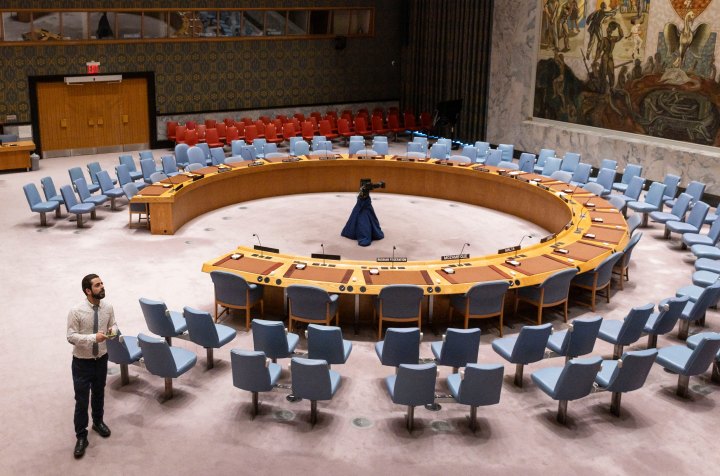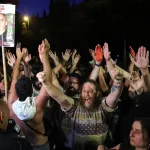MIDDLE EAST CRISIS UPDATE: 21 FEBRUARY 2024
Israel-Hamas war splits G20; US vetoes UN Security Council ceasefire resolution

The Group of 20 countries are so fragmented on the Israel-Hamas war and Russia’s invasion of Ukraine that they may be forced to reduce the forum’s scope to avoid geopolitical issues altogether this year.
The US blocked a United Nations Security Council resolution backing a ceasefire in Gaza as it pushes forward its efforts to stop an Israeli assault on Rafah, where more than a million Palestinians have sought refuge.
Thirteen of 15 Security Council members voted in favour of the text proposed by Algeria, the only Arab nation currently sitting on the council. The US, which wields veto power, blocked the resolution, and the UK abstained.
Israel-Hamas war splits G20, risking paralysis at meeting
The Group of 20 countries are so fragmented on the Israel-Hamas war and Russia’s invasion of Ukraine that they may be forced to reduce the forum’s scope to avoid geopolitical issues altogether this year, according to people familiar with the matter.
Removing all sensitive political topics from G20 statements would diminish the relevance of the format, said one of the people, who spoke on the condition of anonymity. But that would give the group the chance to reach consensus on other issues.
G20 foreign ministers will meet in Rio de Janeiro starting on Wednesday, when the group is expected to discuss the conflict in the Middle East. Complicating the upcoming gathering is the fact that Brazilian President Luiz Inácio Lula da Silva over the weekend compared Israel’s war on Hamas with Adolf Hitler’s extermination of Jews during the Holocaust.
Lula sets the tone for the so-called Global South since Brazil holds the rotating presidency of the G20. Several Latin American countries have pulled their ambassadors from Israel amid its war on Hamas and South Africa has filed a lawsuit with the International Court of Justice, accusing Israel of genocide.
The Group of Seven represents the US and its main allies while the G20 brings together countries from across the spectrum, including China, and so it becomes a focus for global disputes. Israel is not a member of the G20.
In the run-up to the meeting of foreign ministers — as well as a gathering of the finance ministers next week — officials representing countries of the Global South including South Africa and Brazil have said they want their position that Israel is committing genocide against the Palestinian people reflected in any joint G20 statement, according to the people.
That wording has been rejected by several other G20 nations including the US and Germany, the people said.
Brazil has explored strategies to keep the Israel-Hamas and Russia-Ukraine wars from overshadowing the rest of the agenda, such as issuing a single statement at the end of Brazil’s presidency in November, rather than after each ministerial meeting, according to the people.
Some members representing the Global South have argued that the G20 should drop any references to geopolitical conflicts, including Russia’s war against Ukraine, since an agreement on those issues is seen as impossible, said the people. The upshot could be that any future G20 statement will be shorter and less political.
It also means that the G20 format would re-focus on its initial aim of fostering economic cooperation and strengthening fiscal resilience to prevent a repeat of a global financial crisis, according to the people.
US vetoes UN Security Council resolution urging Gaza ceasefire
The US blocked a United Nations Security Council resolution backing a ceasefire in Gaza as it pushes forward its efforts to stop an Israeli assault on Rafah, where more than 1 million Palestinians have sought refuge.
Thirteen of 15 Security Council members voted in favour of the text proposed by Algeria, the only Arab nation currently sitting on the council. The US, which wields veto power, blocked the resolution, and the UK abstained. The draft demanded an immediate humanitarian ceasefire, warned about the forced displacement of Palestinians and called for the release of all hostages.
“The Security Council cannot afford passivity in the face of the call for a ceasefire in Gaza,” Amar Bendjama, the Algerian envoy to the UN, said ahead of the vote on Tuesday. “Silence and contempt is not a viable option. Now is the time for action and the time for truth.”
The US blocked the resolution after arguing it would interfere with efforts by President Joe Biden and his Qatari and Egyptian counterparts to broker a deal that would lead to the release of hostages held by Hamas, which is designated a terrorist organisation by the US and European Union, and boost aid delivery into Gaza. Qatar said over the weekend that those negotiations had stalled.
“Sometimes hard diplomacy takes more time than any of us might like,” US Ambassador Linda Thomas-Greenfield said before the UN vote. “Any action this council takes right now should help, not hinder, these sensitive and ongoing negotiations. And we believe that the resolution on the table right now would, in fact, negatively impact those negotiations.”
The US alternative calls for a temporary ceasefire and the release of all hostages held by Hamas while also warning against an Israeli assault on Rafah unless arrangements are made for civilians there to be moved to relative safety. Israeli Prime Minister Benjamin Netanyahu has said that will be done without explaining how.
The decision to call for a truce “as soon as practicable” marks a shift in policy for Washington, which has voted against multiple texts that openly called for a ceasefire since the 7 October attacks by Hamas.
The war with Hamas began when the militant group invaded southern Israel, carrying out attacks that left about 1,200 people dead and resulted in some 250 people being kidnapped. Since the fighting began, more than 29,000 Palestinians have been killed in Gaza, according to health officials in the Hamas-run territory.
More than half of Gaza’s 2.3 million people fled to the Rafah area in recent months as Israel concentrated its military operations on areas farther north. Israel has now warned it will launch a ground offensive in the region as soon as March unless hostages still held by Hamas are released.
The US, European Union and other key Israeli allies have voiced strong criticism of a potential assault on Rafah. The US text warns that a ground offensive in the area would lead to “further harm to civilians and their further displacement including potentially into neighbouring countries, which would have serious implications for regional peace and security”, according to a draft reviewed by Bloomberg News.
The text also condemns calls by Israeli ministers for the resettlement of Palestinians, rejecting “any attempt at demographic or territorial change in Gaza,” and endorses a two-state solution to the Israel-Palestine conflict.
Israel weighs Eichmann-style public trials for 7 October attackers
Over four months in 1961, Holocaust mastermind Adolf Eichmann sat in a bulletproof booth in a makeshift Jerusalem courtroom and, with cameras whirring, was tried by the state of Israel for crimes against humanity. Two years later, after failed appeals, he was hanged — the last execution in the country’s history.
The widely-covered trial held one man accountable for his crimes, but it was aimed at a larger purpose: to chronicle for a sceptical world the Nazi slaughter of six million Jews in irrefutable detail.
Since 7 October, Israelis have been talking about whether to put the hundreds of fighters captured on trial in a similar fashion, especially their leaders.
The prospect of such a set of trials is daunting from numerous perspectives: Should it be domestic or international? Did enough evidence survive? Can individuals be linked to specific crimes? If those caught are minor players, is the spectacle worth it?
There’s also a more complex matter. The world’s view in 1961 of the tiny, struggling state of Israel and of the menace of Nazism is a far cry from how it sees today’s rich, nuclear-powered Jewish state pummeling Gaza and the Islamist Palestinian movement of Hamas.
With many abroad sympathetic to the Palestinian cause, whatever lesson Israel hopes to teach may not go as planned.
Those accused of terrorism in Israel are normally tried in West Bank military courts or through regular criminal proceedings. The brutality of the October attack has prompted calls for a special court and the revival of the death penalty. It has also underlined a divide between those concerned with upholding human rights and the rule of law and those who believe fighting terrorism should be prioritised.
In a paper submitted to the Knesset, Talia Einhorn, a longstanding scholar of international law who favours a special military tribunal, argued that exceptional times demand exceptional responses.
“The terrorists, who invaded the sovereign state of Israel, committed atrocities of a type and scale the Jewish people had not experienced since the Holocaust,” she wrote.
Because few lawyers will agree to work for the defendants and will need high-level security clearance, she proposed that they be assigned from within the military.
Another paper calling for a military procedure, from the Begin Institute for Law and Zionism, invoked the Nuremberg military court set up by the Allies to try top Nazis and the Guantanamo Bay trials held after the 11 September attacks in the US as possible models.
How the captured Hamas fighters will face justice will ultimately be decided by the government and attorney-general, and the Justice Ministry has convened a committee to examine the options. A ministry spokesperson declined to comment on the proceedings.
Simcha Rothman is the chair of the Knesset subcommittee examining the question. In an interview in his Jerusalem office, he said he was inclined to skip a trial and declare the militants unlawful or unprivileged combatants. Under the laws of war, he said, such combatants don’t deserve due process and can be locked away for long periods.
“A trial could take years and take our attention away from where it belongs — figuring out how to deal with terrorists before they do such a thing again,” said Rothman, who is from the far-right Religious Zionist party. He has introduced a Bill to prevent the public defender’s office from taking part in any such trial.
“Why should we pay for their defence?” he asked, adding, “I wouldn’t impose this on any public defender.”
Others say that Israel’s criminal laws are sufficient and that defendants can and must be provided with good legal counsel.
Now in its fifth month, Israel’s war against Hamas has killed more than 29,000 Palestinians in Gaza. Israel says more than a third of those were fighters.
Israeli security forces haven’t revealed much about the detainees to keep Hamas in the dark. It’s unknown, for example, how many fighters are being held, and whether any major commanders are among them. What is clear is that the group’s chief in Gaza, Yahya Sinwar, and its military leader, Mohammed Deif, are still at large.
From Israel’s perspective, the International Criminal Court might be the best forum for trying such top-level figures, as it would put them in league with Serbia’s Slobodan Milosevic and others accused of masterminding atrocities.
But Rothman, the legislator, says that a great deal will depend on how the military operation ends — and no decision can be made until then.
“We know the importance of the Eichmann trial,” he said. “If we capture Sinwar, we would want a certain kind of trial. But if we only get men who stood guard, it’s not the same.” DM




















 Become an Insider
Become an Insider
It would be nice to see Sinwar being pulled like a rat out of a hole and put on trial for his crimes against humanity
The US must be the only country in the world that is not marching out of step.
If you are the only one marching to a different drum then it is you that is out of step.